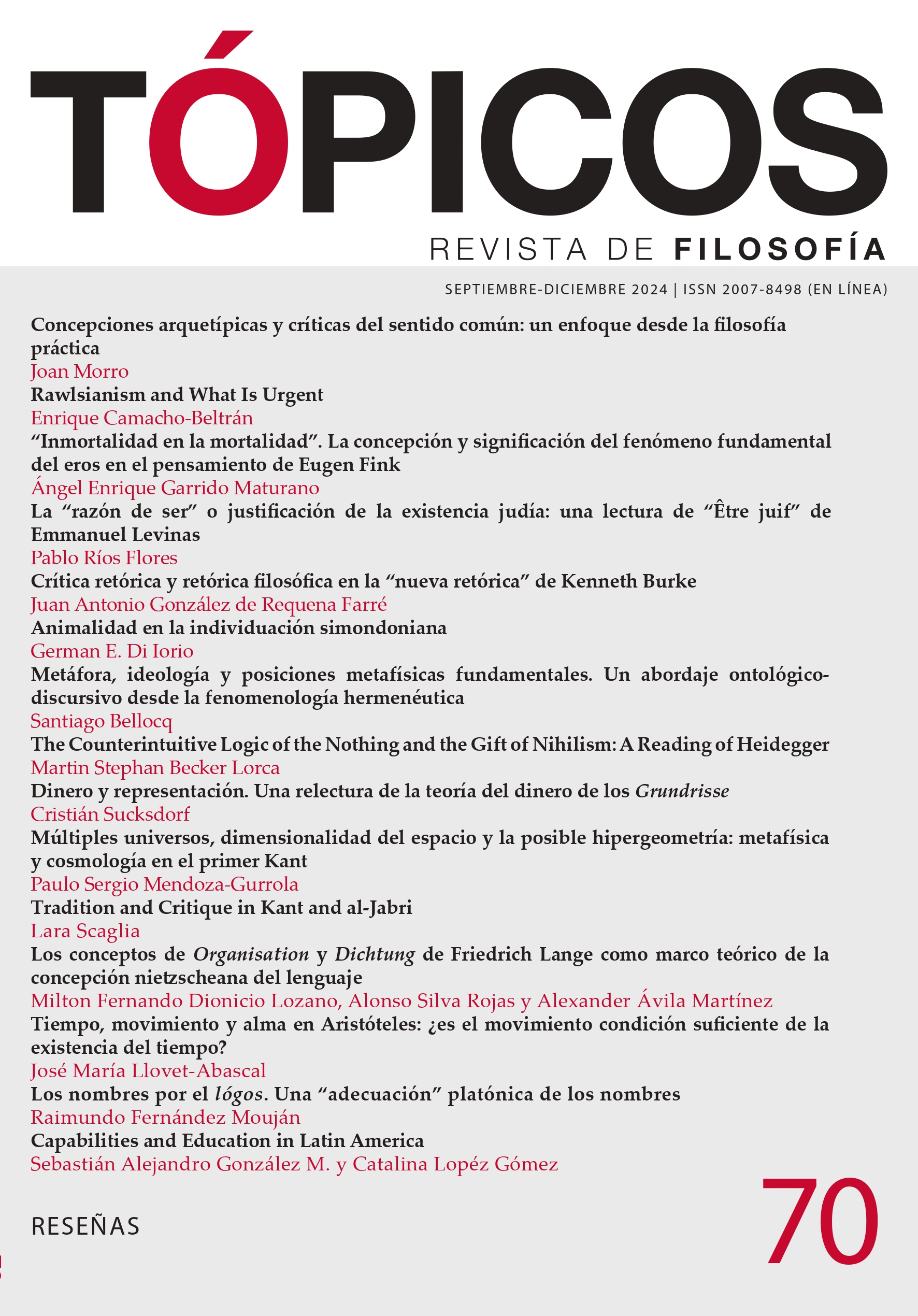Pubblicato 2024-08-15
Come citare
Copyright (c) 2024 Tópicos, Revista de Filosofía

Questo lavoro è fornito con la licenza Creative Commons Attribuzione - Non commerciale - Non opere derivate 4.0 Internazionale.
Downloads
Altmetrics
Citas
Abstract
En este artículo me centro en la noción de Dios de Kant. Muestro que su filosofía crítica cambió el significado y la función de conceptos tradicionales. Después discuto a un filósofo del mundo árabe contemporáneo, al-Jabri, quien fue influenciado por Kant: el autor de la Crítica de la razón árabe comparte con Kant una insatisfacción respecto a cierto uso de la razón que no indaga sobre sus límites. La filosofía debe enfrentarse a su tradición, liberarse de prejuicios, buscar razones e investigar el origen y los usos de sus conceptos, pero analizar críticamente la tradición no implica que el pasado no pueda ayudar a trazar el camino para el futuro. Una nueva lectura de la tradición podría ayudar a modernizar el Islam sin perder elementos culturales de identidad.
Riferimenti bibliografici
- Allison, H. (2000). Is the Critique of Judgment “Post-Critical? In S. Sedgwick (ed.), The Reception of Kant’s Critical Philosophy: Fichte, Schelling, and Hegel. (pp. 78-92). Cambridge University Press.
- Al-Farabi, A. N. M. (1971). Fuṣūl Muntazaʿah. Dar al-Mashriq.
- Al-Jabri, M. A. (1994). Introduction à la critique de la raison arabe. A. Mahfoud & M.Geoffroy (tras.). La Découverte.
- Al-Jabri, M. A. (1999). Arab-Islamic Philosophy: A Contemporary Critique. A. Abbassi (trans.). The University of Texas Press.
- Al-Jabri, M. A. (2001). Ibn Rushd, syrah wa fikr. Markaz Dirasat al-Wahdah al-‘Arabiyyah.
- Al-Jabri, M. A. (2006). Al-Turāth wa-l-hadāthah. Markaz Dirasat al-Wahdah al-‘Arabiyyah.
- Al-Jabri, M. A. (2011). The Formation of Arab Reason: Text, Tradition and the Construction of Modernity in the Arab World. Centre for Arab Unity Studies (trans). I. B. Tauris.
- Al-No’man, T. (2008). La responsabilité dans la culture arabe islamique : épreuve pour l’individu, monopole des plus âges et des plus puissants. In E. Sizoo (ed.), Responsabilité et cultures du monde. Dialogue autour d’un défi collectif. (pp. 183-208). Éditions Charles Léopold Mayer.
- Al-Tamamy, S. M. S. (2014). Averroes, Kant, and the Origin of the Enlightenment. I. B. Tauris.
- Brandt, R. (1989). The Deduction of the Critique of Judgment: Comments on Hampshire and Horstmann. In E. Förster (ed.), Kant’s Transcendental Deductions. (pp. 177-192). Stanford University Press.
- Daifallah, Y. (2012). Political Subjectivity in Contemporary Arab Thought: The Political Theory of Abdullah Laroui, Hassan Hanafi, and Mohamed Abed al-Jabri. [Ph.D. dissertation, University of California, Berkeley]. eScholarship: Open Access Publications from the University of California. URL: https://escholarship.org/uc/item/1cc0g870.
- Druart, T. A. (1997). The Ethics of al-Razi (865-925?). Medieval Philosophy and Theology, 6, 47-71.
- Firestone, C. L. & Jacobs, N. (2008). In Defense of Kant’s Religion. Indiana University Press.
- Grier, M. (1997). Kant on the Illusion of a Systematic Unity of Knowledge. History of Philosophy Quarterly, 14, 1-28.
- Grünenberg, R. & Hegasy, S. (2009). Ex okzidente lux. Der arabische Aufklärer Mohammed Abed al-Jabri. In M. al-Jabri, Kritik der arabischen Vernunft. Die Einführung. (pp. 7-21). Perlenverlag.
- Guyer, P. (1997). Kant and the Claims of Taste. Cambridge University Press.
- Hare, J. E. (1996). The Moral Gap: Kantian Ethics, Human Limits, and God’s Assistance. Clarendon Press.
- Hasan, A. (2011, July 2). Democracy, Religion and Moral Values: A Road Map Toward Political Transformation in Egypt. Foreign Policy Journal. URL: https://www.foreignpolicyjournal.com/2011/07/02/democracy-religion-and-moral-values-a-road-map-toward-political-transformation-in-egypt/ .
- Hegasy, S. (2018). Dare to Be Wise! On the Reception of Mohammed Abed al-Jabri Post-2011. In Z. Eyasad, F. Corrao & M. Hashas (eds.), Islam, State, and Modernity: Mohammed Abed al-Jabri and the Future of the Arab World. (pp. 183-204). Palgrave.
- Horstmann, R. (1989). Why Must There Be a Transcendental Deduction in Kant’s Critique of Judgment? In E. Förster (ed.), Kant’s Transcendental Deductions. (pp. 157-176). Stanford University Press.
- Ibn Al-Nadīm. (1872). Al-Fihrist. T. Flugel (ed.). Vogel.
- Ibn Rushd. (1999). The Definitive Statement: Determining the Relationship between Divine Law and Human Wisdom. C. Butterworth (trans.). Routledge.
- Kant, I. (1996a). Practical Philosophy. M. J. Gregor (trans.). Cambridge University Press.
- Kant, I. (1996b). Religion and Rational Theology. A. W. Wood & G. di Giovanni (trans.). Cambridge University Press.
- Kant, I. (1998). Critique of Pure Reason. P. Guyer & A. Wood (trans.). Cambridge University Press.
- Kant, I. (2000). Critique of the Power of Judgement. P. Guyer (trans.). Cambridge University Press.
- Keller, C. A. (1996). Une approche de la mystique dans les religions occidentales et orientales. Albin Michel.
- Khirallah, I. (2020). Responsibility. Between Al-Jabri’s Deconstruction of the Arabic-Islamic Tradition and Hans Jonas’s Ethical Theory: Parallels and Discords. [Ph.D. dissertation, University of Wrocław].
- Laroui, A. (1978). La Crise des intellectuels arabes : traditionalisme ou historicisme ? Maspero.
- Makkreel, R. (2006). Reflection, Reflective Judgment, and Aesthetic Exemplary. In R. Kukla (ed.), Aesthetics and Cognition in Kant’s Critical Philosophy. (pp. 223-244). Cambridge University Press.
- Palmquist, S. (2000). Kant’s Critical Religion. Ashgate.
- Pasternack, L. (2014). Kant’s Religion within the Boundaries of Mere Reason: An Interpretation and Defense. Routledge.
- Plantinga, A. (1966). Kant’s Objection to the Ontological Argument. The Journal of Philosophy, 63(19), 537-546.
- Reardon, B. (1988). Kant as Philosophical Theologian. Macmillan Press.
- Tuschling, B. (1992). The System of Transcendental Idealism: Questions Raised and Left Open in the Kritik der Urteilskraft. The Southern Journal of Philosophy, 30, 109-127.
- Youssef, M. K. R. (1999). Al-Muru’a According to the Prophet, the Companions and the Followers. Dar Ibn Hazm.





